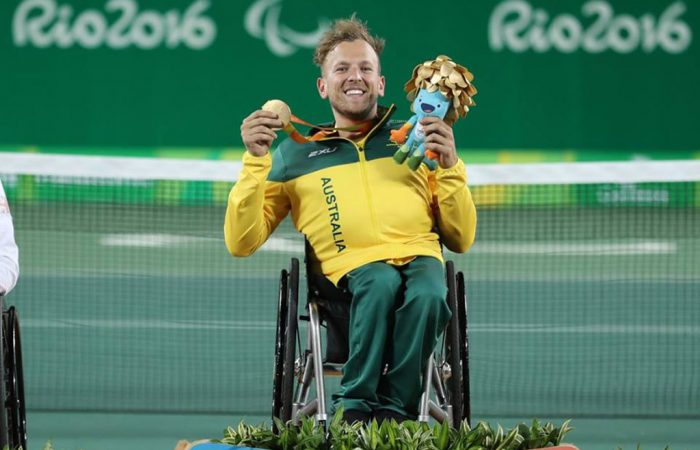Alcott inspirational in Paralympic victory
Dylan Alcott has come a long way since his traumatic years as a school-aged chid, serving as an inspirational example to both emerging Paraympic athletes and people with a disability.
Rio de Janeiro, State of Rio de Janeiro, Brazil, 15 September 2016 | AAP

Sixteen years ago, Dylan Alcott was bullied in school for being overweight and in a wheelchair.
Now he’s a dual gold medallist after the 25-year-old triple Paralympian won Australia’s first singles wheelchair tennis gold medal of the Rio Games on Wednesday (Thursday AEST).
The world No.1 player in the quad class defeated Great Britain’s Andy Lapthorne 6-3 6-4, backing up from his gold medal-winning doubles match the previous night with Heath Davidson.
It was Australia’s first Paralympic singles gold in sixteen years and the Victorian says his nine-year-old self would never have believed it.
“I was an insecure kid about my disability. A few kids used to call me a cripple and I hate that word. I used to believe them,” he said.
The two victories make Alcott one of a handful of Australians to win gold medals in two sports, after switching from wheelchair basketball.
The Melburnian won gold with the Rollers in Beijing in 2008 at age 17 and silver with them again in London.
“I don’t know many people with a resume like that,” he said. “This is probably sweeter because I’ve worked harder for this.”
Alcott served at 65 per cent for the match and generated 39 winners to Lapthorne’s 14, while the Brit yielded only 18 unforced errors, to Alcott’s 37 as he persisted with his aggressive approach.
Born with a tumour wrapped around his spinal cord, Alcott underwent major surgery at three days old which resulted in paraplegia.
He says he’s lucky to be alive.
“They thought I’d never be sitting up straight,” Alcott said. “If you told my doctors I’d be a gold medallist, they’d say no way.”
Alcott said kids with disabilities and people who have accidents are led to believe that their life is over, and it couldn’t be further from the truth.
“I have a beautiful able-bodied girlfriend, I’ve just won a gold medal. I have supportive friends and family, of which about 30 paid to watch me play because they love me so much, I’ve got an income, I travel the world,” he said.
“I love my life. If I ever have the opportunity to change it with, you know, robotic legs and all the crap that’s coming out now, you couldn’t pay me enough to do it.”